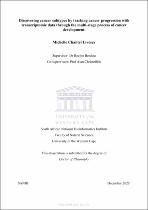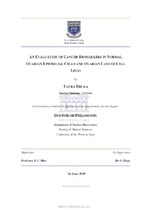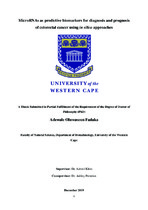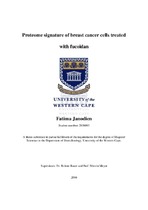| dc.contributor.advisor | Bendou, Hocine | |
| dc.contributor.author | Livesey, Michelle Chantel | |
| dc.date.accessioned | 2024-04-02T14:20:52Z | |
| dc.date.available | 2024-04-02T14:20:52Z | |
| dc.date.issued | 2023 | |
| dc.identifier.uri | http://hdl.handle.net/11394/10705 | |
| dc.description | Philosophiae Doctor - PhD | en_US |
| dc.description.abstract | Background: The development of cancer is driven by genomic alterations, which become more heterogeneous as the disease progresses throughout the stages. Consequently, cancer patients have differential levels of sensitivity to treatment. Tumor heterogeneity thus contributes to therapeutic failure, which ultimately leads to the generally poor prognosis and poor overall survival outcome associated with cancer. Introduction: Transcriptomic profiles can be used to track cancer progression based on gene expression changes that occur throughout the multi-stage process of cancer development. The accumulated genetic changes can be detected when gene expression levels in advanced-stage are less variable but show high variability in early-stage. Normalizing advanced-stage expression samples with early-stage and clustering of the normalized expression samples can reveal cancers with unique gene expression patterns based on cancer progression. Aims: A computational method was employed to investigate cancer progression through RNASeq expression profiles across the multi-stage process of cancer development. The method was assessed in a subtype of the heterogeneous kidney cancer and enabled the discovery of in-depth cancer subtypes based on the differences in gene expression profiles. Methods: A preliminary study was performed by downloading RNA-sequenced gene expression and associated phenotypic and survival profiles of Diffuse Large B-cell Lymphoma, Lung cancer, Liver cancer, Cervical cancer, and Testicular cancer from the UCSC Xena database. Similarly, Kidney renal clear cell carcinoma (KIRC) was downloaded as a validation dataset. Advanced-stage samples were normalized with early-stage to consider heterogeneity differences in the multi-stage cancer progression. The normalized gene expression of the preliminary cancer datasets was subjected to weighted gene co-expression network analysis. Gene modules were linked to cancer-related proteins and pathways using enrichment analyses. | en_US |
| dc.language.iso | en | en_US |
| dc.publisher | University of the Western Cape | en_US |
| dc.subject | Cancer progression | en_US |
| dc.subject | Transcriptomic profiles | en_US |
| dc.subject | Normalization | en_US |
| dc.subject | Cancer heterogeneity | en_US |
| dc.subject | Subtyping | en_US |
| dc.title | Discovering cancer subtypes by tracking cancer progression with transcriptomic data through the multi-stage process of cancer development. | en_US |
| dc.type | Thesis | en_US |
| dc.rights.holder | University of the Western Cape | en_US |




